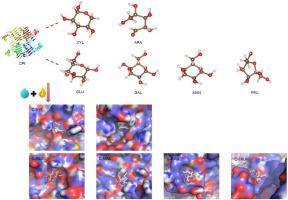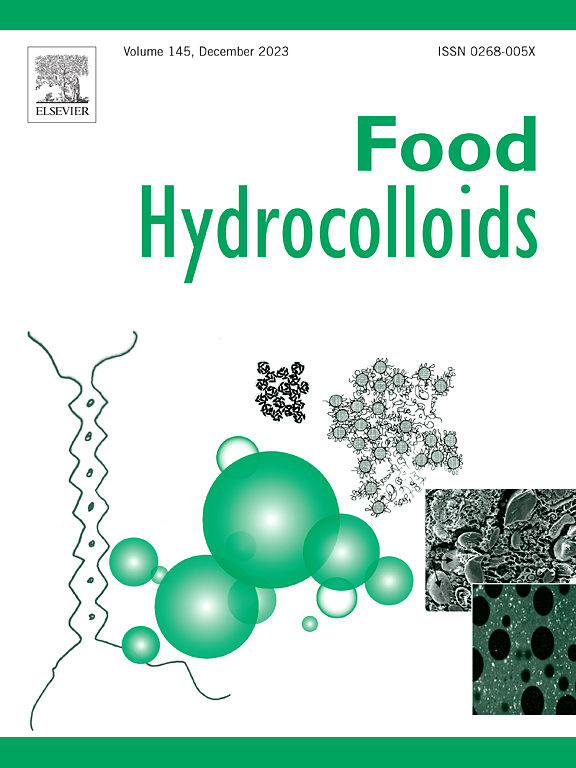基于分子对接的单糖糖化对椰子分离蛋白结构特征和功能特性的影响
IF 11
1区 农林科学
Q1 CHEMISTRY, APPLIED
引用次数: 0
摘要
该研究考察了五碳和六碳单糖糖化对椰子分离蛋白(CPI)结构和理化性质的影响。与原生椰子蛋白相比,椰子蛋白/单糖复合物表现出更高的吸光比(A294/A420)和糖化度。结构分析表明,无序结构(β-匝和无规线圈)增加,荧光发射蓝移,紫外吸收率升高,表明蛋白质解折和疏水基团暴露。糖化大大提高了 CPI 的溶解度、乳化能力、持油能力和热稳定性。分子对接模拟强调了氢键在复合物形成中的重要性。这些发现深入揭示了蛋白质与碳水化合物之间的相互作用,为各种工业应用提供了潜力,并为未来的研究提供了指导。本文章由计算机程序翻译,如有差异,请以英文原文为准。

Effects of monosaccharides glycation on structural characteristics and functional properties of coconut protein isolate based on molecular docking
The study examined the impact of glycation with five-carbon and six-carbon monosaccharides on the structure and physicochemical properties of coconut protein isolate (CPI). Compared to native CPI, CPI/monosaccharide complexes exhibited higher absorbance ratios (A294/A420) and glycation degrees. Structural analysis revealed an increase in disordered structures (β-turn and random coil), a blue shift in fluorescence emission, and elevated UV absorbance, indicating protein unfolding and exposure of hydrophobic groups. Glycation significantly enhanced CPI's solubility, emulsifying capacity, oil holding capacity, and thermal stability. Molecular docking simulations emphasized the importance of hydrogen bonding in complex formation. These findings provide insights into protein-carbohydrate interactions, offering potential for diverse industrial applications and guiding future research.
求助全文
通过发布文献求助,成功后即可免费获取论文全文。
去求助
来源期刊

Food Hydrocolloids
工程技术-食品科技
CiteScore
19.90
自引率
14.00%
发文量
871
审稿时长
37 days
期刊介绍:
Food Hydrocolloids publishes original and innovative research focused on the characterization, functional properties, and applications of hydrocolloid materials used in food products. These hydrocolloids, defined as polysaccharides and proteins of commercial importance, are added to control aspects such as texture, stability, rheology, and sensory properties. The research's primary emphasis should be on the hydrocolloids themselves, with thorough descriptions of their source, nature, and physicochemical characteristics. Manuscripts are expected to clearly outline specific aims and objectives, include a fundamental discussion of research findings at the molecular level, and address the significance of the results. Studies on hydrocolloids in complex formulations should concentrate on their overall properties and mechanisms of action, while simple formulation development studies may not be considered for publication.
The main areas of interest are:
-Chemical and physicochemical characterisation
Thermal properties including glass transitions and conformational changes-
Rheological properties including viscosity, viscoelastic properties and gelation behaviour-
The influence on organoleptic properties-
Interfacial properties including stabilisation of dispersions, emulsions and foams-
Film forming properties with application to edible films and active packaging-
Encapsulation and controlled release of active compounds-
The influence on health including their role as dietary fibre-
Manipulation of hydrocolloid structure and functionality through chemical, biochemical and physical processes-
New hydrocolloids and hydrocolloid sources of commercial potential.
The Journal also publishes Review articles that provide an overview of the latest developments in topics of specific interest to researchers in this field of activity.
 求助内容:
求助内容: 应助结果提醒方式:
应助结果提醒方式:


